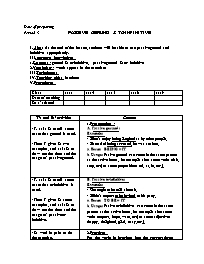Ôn tập môn Tiếng Anh khối 11 - Period 3: Passive gerund & to - Infinitive

I. Aim: At the end of the lesson, students will be able to use passive gerund and infinitive appropriately.
II.Language knowledge:
1.Grammar: gerund & to-infinitive, passive gerund & to- infinitive
2.Vocabulary: words appear in the exercises
III.Techniques:
IV.Teaching aids: handouts
V.Procedure:
Bạn đang xem tài liệu "Ôn tập môn Tiếng Anh khối 11 - Period 3: Passive gerund & to - Infinitive", để tải tài liệu gốc về máy bạn click vào nút DOWNLOAD ở trên
Date of preparing: Period: 3 PASSIVE GERUND & TO-INFINITIVE I. Aim: At the end of the lesson, students will be able to use passive gerund and infinitive appropriately. II.Language knowledge: 1.Grammar: gerund & to-infinitive, passive gerund & to- infinitive 2.Vocabulary: words appear in the exercises III.Techniques: IV.Teaching aids: handouts V.Procedure: Class 11a1 11a4 11a5 11a6 11a9 Date of teaching Sts s’ adsend T’s and Ss’ activities Content - T. asks Ss to tell some cases that gerund is used. - Then T gives Ss two examples, and asks Ss to draw out the form and the usage of passive gerund. 1.Presentation: A. Passive gerund: Example: - I don’t enjoy being laughed at by other people. - Instead of being accused, he was set free. a. Form: BEING + PP b. Usage: Pasive gerund can come in the same pattern as the active forms, for example after some verbs (risk, stop, ect) or some prepositions (of, at, in, etc.). - T. asks Ss to tell some cases that to-infinitive is used. - Then T gives Ss some examples, and asks Ss to draw out the form and the usage of passive to-infinitive. B. Passive to-infinitive: Example: - She ought to be told about it. - I didn’t expect to be invited to his party. a. Form: TO BE + PP b. Usage: Pasive to-infinitive can come in the same pattern as the active forms, for example after some verbs (expect, hope, want, ect) or some adjectives (happy, delighted, glad, easy, etc.). - Ss work in pairs to do the exercise. - T. calls on some Ss to read their answers, and correct their answers if necessary. 2.Practice: Put the verbs in brackets into the correct form: It is easy (fool) .. by his lies. Martha doesn’t like to have her picture taken. She avoids (photograph) I appreciate (invite) . to your home. Let’s not risk (catch) . In a traffic jam. The government tried to stop the book (publish) . (search) .. by customs officers is unpleasant. There’s a lot of work (do). The new students hope (include) ............ in many of the school’s social activities. When the police first questioned him, he denied (involve) . in the robbery. I remember (take) . to the zoo when I was a child. We managed to climbed over the wall without (see) ... Isabel expected (admit) ..to the university, but she wasn’t. The tin opener seems (design) ... for left-handed people. Many reliable methods of storing information tended (forget) . When the computers arrived. She resented (ask) to make tea for everyone at the meeting. Let’s leave early. We can’t risk (hold up) in heavy traffic during rush hour. Answer key: to be fooled being taken being invited being caught being published Being searched to be done / to do to be included being involved being taken being seen to be admitted to be designed to be forgotten being asked being held up - T. sets homework. - Ss do the task at home. 3. Homework: Revise today’s lesson. Do all the exercises again. Comments:
Tài liệu đính kèm:
 period 3.docx
period 3.docx





